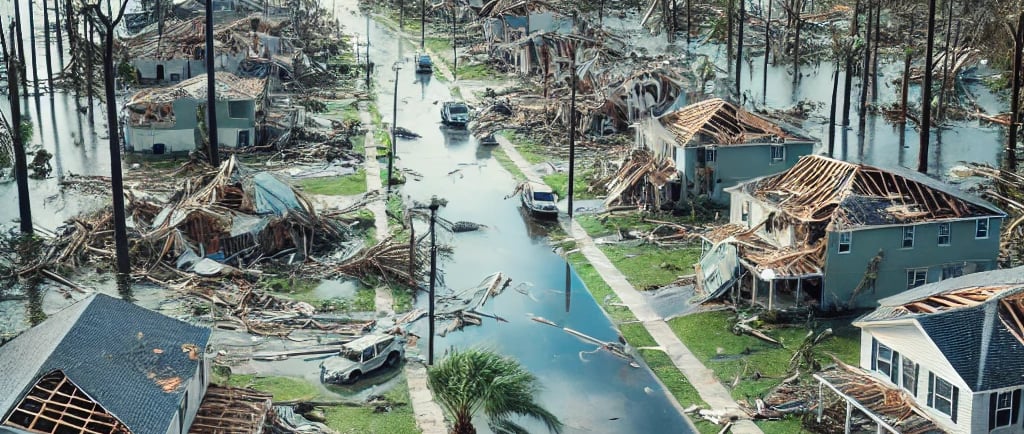Unmasking the Storm: Navigating Insurance Fraud in the Wake of Hurricanes
Explore the vital role of insurance fraud detection in post-hurricane recovery. Learn how advanced technology and ethical practices help protect policyholders and insurers from fraudulent claims, ensuring fairness and efficiency in the aftermath of natural disasters.
FRAUD INVESTIGATIONSINSURANCE FRAUD PRIVATE INVESTIGATION DIGITAL SURVEILLANCE FLORIDA HURRICANE AFTERMATH


In the wake of a hurricane, as the physical winds of destruction subside, another storm can emerge—one of insurance fraud. As homeowners and businesses face the aftermath of devastation, insurance claims surge, creating opportunities for fraudulent activities to slip through the cracks. This article explores the critical role of insurance fraud detection, a guiding light amidst the turbulent process of post-hurricane recovery.
The Scope of Insurance Fraud After Hurricanes
Hurricanes, due to their wide-ranging impact, can foster various forms of insurance fraud. Common examples include:
Over-Claiming: Inflating the extent of damage or claiming losses that didn’t occur.
Under-Reporting: Initially claiming minimal damage to secure a quick payout, then later submitting additional claims through fraudulent contractors or adjusters.
Falsified Claims: Completely fabricating damage, which can include staging scenes or altering evidence post-storm.
The Role of Insurance Fraud Detection Services
In response to these risks, specialized insurance fraud detection services have become vital for both insurers and policyholders. These services provide the tools and expertise necessary to identify and mitigate fraudulent activities. Key features include:
Thorough Background Checks on Adjusters: Every adjuster involved in the claims process is subject to rigorous background checks, not only verifying their credentials but also scrutinizing their history for complaints, legal issues, or previous involvement in suspicious activities.
Claim Pattern Analysis: Advanced analytics allow for the detection of unusual spikes in specific types of claims. Fraudulent schemes often target damage that is more difficult to verify, and by comparing patterns across different storms and regions, potential red flags can be identified early.
AI and Machine Learning Integration: Leveraging AI, these services can process vast amounts of data to identify anomalies. Machine learning models trained on historical fraud cases can predict and flag suspicious new claims by analyzing factors such as claim amount, timing, frequency, and location relative to hurricane impact areas.
Comprehensive Case Reports: Policyholders receive detailed reports comparing their claim to similar cases. This helps clarify the legitimacy of their claim, offering a benchmark for negotiations or litigation if needed.
Real-Time Monitoring: Continuous monitoring of communications, adjustments, and repair estimates during the claims process can uncover warning signs before they escalate into legal or financial issues.
Benefits for Policyholders and Insurers
For policyholders, these services provide:
Protection: Ensuring that legitimate claims are processed fairly without being delayed or overshadowed by fraudulent ones.
Peace of Mind: Having expert oversight during the claims process reduces the risk of fraud impacting their recovery funds.
For insurers, the advantages include:
Increased Efficiency: Legitimate claims can be processed faster when fraudulent ones are detected and addressed early.
Cost Savings: Minimizing payouts on fraudulent claims translates to significant cost reductions, benefiting both insurers and policyholders in the form of lower premiums or more efficient allocation of resources for genuine recovery efforts.
Ethical Considerations in Fraud Detection
While detecting fraud is crucial, it is equally important to handle investigations with care. Respecting the privacy of claimants and adhering to legal and ethical standards ensures that the process remains fair. Investigators must strike a balance between thorough scrutiny and the protection of individuals' rights.
Conclusion
Insurance fraud detection plays an essential role in the recovery process after a hurricane, restoring trust in the insurance system and ensuring that those who are most in need of assistance receive it without delay. As hurricanes and other natural disasters become more frequent, the importance of these services will continue to grow. By embracing cutting-edge technology and maintaining ethical practices, insurance fraud detection acts as a vital safeguard in the wake of disaster, ensuring justice and fairness prevail over deception.


